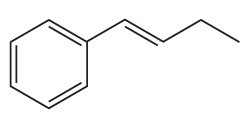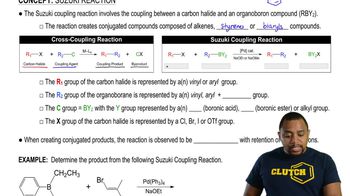Here are the essential concepts you must grasp in order to answer the question correctly.
Suzuki Reaction
The Suzuki reaction is a cross-coupling reaction that allows for the formation of carbon-carbon bonds between aryl or vinyl boronic acids and halides. This reaction is facilitated by palladium catalysts and is particularly useful for synthesizing biaryl compounds, which are prevalent in pharmaceuticals and organic materials. Understanding the mechanism, which involves oxidative addition, transmetalation, and reductive elimination, is crucial for applying this reaction effectively.
Recommended video:
Heck Reaction
The Heck reaction is another type of palladium-catalyzed cross-coupling reaction that involves the coupling of aryl halides with alkenes to form substituted alkenes. This reaction is valuable for constructing complex organic molecules and is widely used in the synthesis of pharmaceuticals and agrochemicals. A solid grasp of the reaction conditions, such as the choice of base and solvent, is essential for optimizing yields and selectivity.
Recommended video:
Functional Group Compatibility
In organic synthesis, understanding functional group compatibility is vital for predicting the outcomes of reactions. Different functional groups can influence the reactivity and selectivity of reactions, such as the Suzuki and Heck reactions. For instance, electron-withdrawing or electron-donating groups can affect the stability of intermediates and the overall reaction pathway, making it important to consider these effects when designing synthetic routes for target compounds.
Recommended video:
Identifying Functional Groups

 Verified step by step guidance
Verified step by step guidance Verified video answer for a similar problem:
Verified video answer for a similar problem:

